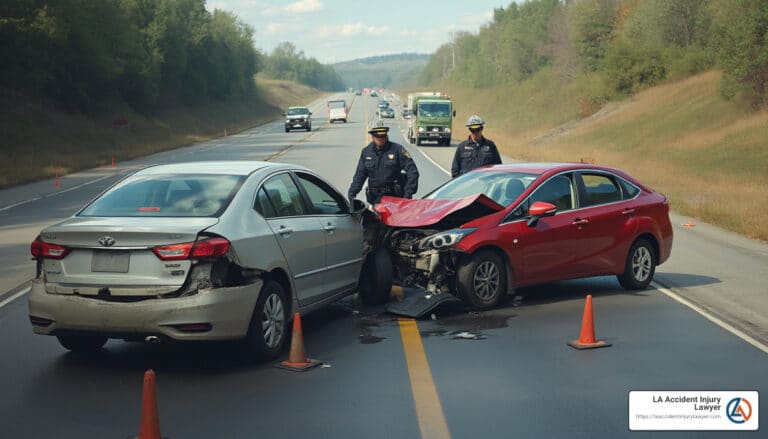Los Angeles’s sunny weather might inspire the thought of riding in the back of a pickup truck. However, California law is strict about this, mainly to prevent accidents and injuries.
Before hopping into the cargo bed, it’s essential to know the laws, the safety risks, and what legal options exist in case of an accident.
If you are injured in an accident, our auto accident lawyer in Los Angeles is here to help. We can review your case and let you know how to move forward.
Understanding California Law
Under California Vehicle Code Section 23116, it is generally illegal to ride in the back of a pickup truck or flatbed vehicle while traveling on a public road. The law prohibits the driver from transporting passengers and passengers from riding in the cargo area unless certain exceptions apply.
Exceptions to the Law
There are a few scenarios where the law allows riding in a truck bed:
- Restraint Systems: The ride is permitted if passengers are properly secured with federally approved seat belts or harnesses that meet motor vehicle safety standards.
- Farm Use: Trucks operated exclusively within a farm or ranch or for trips up to a mile on public roads between two parts of the farm are exempt from this restriction.
- Parades and Events: Passengers may ride in a cargo bed during a supervised parade, but only if the vehicle moves slower than eight miles per hour.
- Emergency Situations: Emergency responders may transport individuals in the back of a truck during rescue or relief efforts.
If none of these exceptions apply, riding in the back of a pickup truck is prohibited. Violators can face fines starting at $100 for the first offense, $200 for the second offense within a year, and $250 for additional offenses.
Safety Risks of Riding in Cargo Beds
The laws are in place for good reason. Pickup truck beds are not designed to transport people—they lack seat belts, airbags, and other safety features to protect occupants in an accident. Even a low-speed collision or a sudden stop can lead to passengers being ejected from the vehicle, causing serious injuries or fatalities.
A study by the National Highway Traffic Safety Administration (NHTSA) highlighted the dangers associated with unrestrained passengers in cargo areas. The lack of proper restraints significantly increases the risk of severe injuries or death, especially if the vehicle rolls over or is involved in a side-impact collision.
Common injuries resulting from these accidents include:
- Head trauma from impacts with the truck bed or the ground.
- Fractures and lacerations due to falls or being ejected from the truck.
- Neck and spine injuries which can occur even at low speeds if the passenger is thrown from the vehicle.
Given these risks, auto accident lawyers in Los Angeles recommend that passengers always ride in designated seating areas, where safety equipment such as seat belts can provide proper protection.
Legal Consequences and Liability Issues
Violating Section 23116 can lead to fines and penalties, including DMV points on your driving record. Points can increase insurance premiums and lead to a suspended license if multiple violations occur within a short time frame.
Drivers and passengers should also be aware of California’s comparative fault rules. If an accident occurs while someone illegally rides in a truck bed, liability may become a complicated issue.
For example, even if the passenger rode illegally, the driver could still bear partial responsibility, especially if the accident resulted from negligent driving. In such cases, the injured party may still recover damages, but the payout could be reduced according to their percentage of fault.
Consulting with a Los Angeles pickup truck accident lawyer is crucial if you’ve been involved in such an accident. An attorney can help determine liability and pursue compensation for medical bills, lost wages, and pain and suffering.
Penalties for Violating the Law
The penalties for riding illegally in a truck bed are relatively straightforward. According to California Vehicle Code Section 21712, drivers who allow passengers to ride in unsafe areas, such as truck beds, may receive a citation, leading to fines and DMV points.
The fine structure is as follows:
- $100 for the first offense.
- $200 for the second offense (if committed within a year of the first).
- $250 for each subsequent offense within the same period
In addition to fines, violations may lead to DMV points, which can accumulate and result in license suspension if too many points are earned over a specified period.
What to Do If You’re Injured in a Pickup Truck Accident
If you’ve been injured while riding in a truck bed—whether legally or not—it is important to take immediate steps to protect your rights:
- Seek Medical Attention: Some symptoms may develop over time even if injuries appear minor.
- Document the Accident: Take photos of the scene and gather contact information from witnesses.
- Contact a Lawyer: A Los Angeles auto accident attorney can help you navigate the legal complexities, especially when liability is contested.
Given the risks involved, insurance companies may try to deny or reduce compensation if the injured party was riding illegally. This makes it critical to have an injury lawyer near you who understands California’s laws and can build a strong case on your behalf.
Contact Our Auto Accident Attorney in Los Angeles Today
Riding in the back of a pickup truck in Los Angeles is largely prohibited for safety reasons, with a few exceptions for parades, farm activities, and emergencies. The risks associated with riding in truck beds are high, given the lack of safety features and the potential for severe injuries.
If you or a loved one has been injured in a truck bed accident, consulting with a Los Angeles truck accident lawyer can make all the difference in securing fair compensation. California’s comparative fault rules and complex liability issues require legal expertise to protect your rights.
Ultimately, while riding in a truck bed might seem like a fun or convenient option, the risks and legal consequences far outweigh the benefits. Staying informed about California’s road safety laws can help you avoid fines, accidents, and potential legal troubles.






